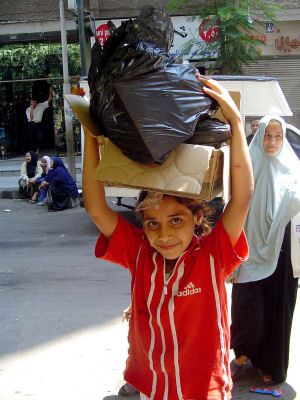Egyptian mother tries to feed children in current food crisis with support of SOS Children
19/06/2008

Update from June 2008
Soaring food prices have deepened Aziza's troubles, a widow and single-mother, who receives assistance from SOS Children Egypt in Cairo, as part of the family strengthening programme.
Zawya el Hamra is the poor Cairo neighborhood where Aziza*, a 33-year-old single mother, and her three children and mother live. The two-bedroom house they rent has no private kitchen or bathroom; both facilities are shared with neighbours. Aziza has participated in the family strengthening programme (FSP) in Cairo for the past two years. The programme enables children who are at risk of losing the care of their family to grow within a caring family environment through assistance and empowerment.
Aziza's husband, who earned his livelihood from selling vegetables on the streets, passed away eight years ago. A few months after his death, she lost everything they owned to her in-laws, including a small piece of land and the home where the family had lived. Today, a mother of three children under the age of 13, Aziza's woes have deepened as a result of the soaring food prices in Egypt.
Aziza's monthly stipend is 240 Egyptian Pounds (EGP) or 44 USD. This is the pension she receives from the local mosque and out of which she pays for rent, electricity, water, and food, among other basics.
Queuing for bread
In Egypt, rice and bread are among the two most important sources of food for many, who can not afford to buy meat, fish, or chicken. The demand on bread made the government impose restrictions on the amounts that Egyptians can buy from governmental bakeries. In Cairo, 20 pieces of local bread, known for its bad quality, are worth one EGP. Buying bread from these bakeries is not simply a matter of money, but a strenuous and nerve-wrecking task.
Waiting in the queue for hours to buy bread has become an everyday routine for Aziza, who despite the effort, does not always manage to return home with it. Governmental bakeries often run out of bread, and bread sold in supermarkets is sold at high prices, making it exclusively for the rich.
Prices of other products have also increased, for example rice is sold for four EGP this year, compared to less than three EGP last year, and lentils are nine EGP, almost double of what people paid last year.
Aziza and her family are one of many participating in FSP, who can no longer afford to feed their children like before. However, with the help she receives from FSP, she has been at least able to keep her children in schools and not force them into child labor. Next year, Aziza will participate in training - also offered through FSP - that will help her start a micro business, enhancing her role as head of household in a country where prices of basic food commodities have skyrocketed.
*The woman's name has been changed to protect her privacy, upon her request.
Relevant Countries: Egypt.